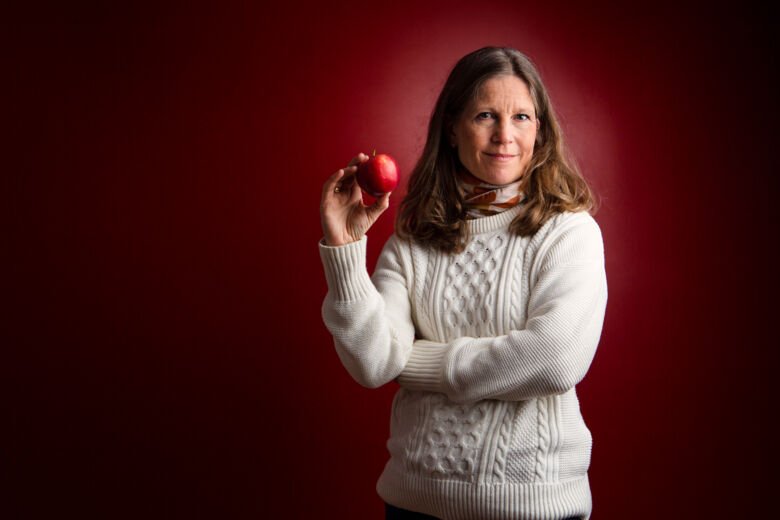Ylva Trolle Lagerros: Hunger can be an ever-present sensation

The abundance of unhealthy food in society means that obesity doctor and researcher Ylva Trolle Lagerros is working against certain headwinds. But the arrival of new medications have made her job more enjoyable. In parallel, she has developed apps that provide patients with support.
Text: Cecilia Odlind, first published in Swedish in Medicinsk Vetenskap, No 4/2023.
At Sweden’s largest obesity clinic, the Center for Obesity, the examination rooms are extra-large and equipped with wide exam tables, chairs and scales that can handle weights significantly above the ordinary. This is where Ylva Trolle Lagerros works.
“If they use a normal scale, a person who weighs more than 150 kilos may think that they’re holding steady at that weight, because the scale has maxed out. We lend special scales to our patients,” she says.
In the waiting room there are also display cases filled with snacks, soft drinks and sweets. Next to each product are sugar cubes and butter packets that correspond to the amount of sugar and fat they contain. It’s eye-opening.
“It’s not that everyone eats really bad food, but many folks eat too much, and in excessively large portions. They eat irregularly and skip meals, which means they get hungry and eat too much later instead,” says Ylva Trolle Lagerros.
Wanted to give support
She has worked with obesity patients for over ten years. Over time, she became frustrated that at the dearth of contact with the patients. For example, when she met a diabetic patient with obesity, she discussed medication, diet, and physical activity. Then the patient walked out the door and didn’t come back until the next year’s check-up.
“I had no idea what was going on with their lifestyle habits, and I didn’t really have the opportunity to influence or support them,” she says.
That’s when she started thinking about how to use mobile phones in treatment. Many people spend several hours a day on their mobile phone. It should be a much better way to communicate with the patient and influence their behaviour than just meeting once a year, thought Ylva Trolle Lagerros.
That was in 2016.
“At the time, people told me that I would only be able to recruit high-income earners with expensive phones. I was told that few patients would want to use an app and that people with a foreign background would be difficult to reach. So the first studies investigated whether it was even possible to get people to use the app for self-monitoring, and whether we could reach out. It went really well for the vast majority of people, and we were able to recruit broadly,” she says.
Today, they’ve teamed up with the Region Stockholm’s Alltid öppet [Always Open] app and are involved in its development. Behavioural changes such as what you eat, when you eat, how physically active you are, etcetera, are supplemented with medications that are registered in the app.
Some people also require surgical treatment or medication to sufficiently reduce their weight. According to Ylva Trolle Lagerros, the new medications that have been around for a few years have made it more fun to work in this area.
“Often, patients may describe hunger as an ever-present, nagging sensation, like tinnitus. The hour before lunch, they’re so hungry that they can’t concentrate at all on their work. Hunger, hunger, hunger is all they can think about. The drugs dampen that feeling. This gives us a new tool. A number of new, even more effective medications are also on the way,” she says.
One of the most high-profile pharmaceutical substances is semaglutide, which was developed for the treatment of type 2 diabetes. Early on, effects on weight were also seen. Since then, several large studies published in the renowned scientific journal The New England Journal of Medicine have pointed to weight loss of an average of 15 per cent of total body weight, with a third of study subjects losing more than 20 per cent. This is comparable to what is achieved with bariatric surgery. The medication has been approved for weight reduction in Sweden. But it doesn’t help everyone equally well.
“These drugs reduce appetite. But we know that you don’t just eat because you’re hungry. You can eat in social settings, or to deal with anxiety. Or as a consolation. In these situations, the meds don’t work as well,” says Ylva Trolle Lagerros.
High demand has also led to a global shortage of semaglutide and all similar drugs, so-called GLP-1 analogues, so right now few of the 1.3 million Swedes with obesity (with a BMI over 30) can access it. The medication is also not approved for reimbursement for people with obesity, so it will be expensive for those who need it. The duration of the treatment also varies; some patients may need to stay on the drug for the rest of their lives.
“If you stop taking the medication, your appetite will return. But by then, hopefully the patient has established new habits,” says Ylva Trolle Lagerros.

Numerous reasons behind obesity
In her research, she is currently studying the pharmaceutical treatment of obesity.
“Up until now, the studies have been conducted on less heavy people with BMIs starting at 27. Patients at the Center for Obesity can have double that. The healthcare sector needs data on all types of patients to be able to provide evidence-based treatment recommendations, but also to make accurate health economic assessments,” says Ylva Trolle Lagerros.
There can be numerous reasons why someone becomes obese. These days, our exposure to unhealthy food, including in social media, is extreme. Eating energy-dense foods and excessively large portions are just a few of the causes. Alcohol causes weight gain, too. But the treatment of a number of diseases also demands drugs that cause weight gain. These include certain medications used to treat mental illness, but insulin and cortisone also increase hunger. Of course, genetics also play a role.
"Different genetics mean different susceptibility to high BMI. For example, some people can tolerate being significantly heavier without developing type 2 diabetes,” she says.
Half of the obese patients who come to the Center for Obesity are under the age of 25. It is important to get to grips with weight problems as early as possible, says Ylva Trolle Lagerros. Not only does obesity increase the risk of health problems such as cardiovascular disease, for a young person it can limit their ability to get an education, move away from home, and find a partner. It can also be an impediment to doing the things they want to do.
“I had a patient whose goal was to be able to go down to the local football pitch to watch her son play a match,” says Ylva Trolle Lagerros.
Living with obesity is also difficult, not least because of the persistent stigma surrounding the disease.
“I hope the new drugs can change that a bit. In the same way that nowadays people with depression are encouraged to take their antidepressants, unlike in the past, when they were encouraged to ‘pull themselves together’, this is about taking their obesity medication instead of just being told to ‘stop eating and start running’,” she says.
But Ylva Trolle Lagerros also stresses that these medications should not be regarded as weight loss solution for everyone carrying around a few extra pounds.
“There is no indication for such prescribing. These meds should be given to people who have become ill due to their weight and who can’t get a transplant, hip surgery, help with fertility issues, or similar treatments because they weigh too much,” she says.
The widespread stigma surrounding obesity has led to body activism, for example in social media.
“They have an important point, and that is that you should like your body. And that’s crucial, because then you also take care of it,” says Ylva Trolle Lagerros.
Many overweight people isolate themselves
But on the contrary, many overweight people are ashamed of their bodies and isolate themselves.
“A lot of folks get stared at. One young man told me that he found it tough that so many people wanted to take selfies with him. We have several patients who are confined to their homes. Luckily, we can reach them digitally,” she says.
A study on cancer patients conducted by Ylva Trolle Lagerros together with a former doctoral student and dietician highlighted this issue clearly. For people with cancer, it is important to maintain their weight, as it increases their chance of survival. But in the study, they saw that women who struggled with their weight earlier in life were very happy to lose weight, even though they understood that it was not good for them.
“So even though their very existence was threatened, the women felt that they had an improved quality of life when they had lost weight. For the men who lost weight it was different; they felt weak. I think these outcomes say a lot about our ideals and how we see women’s bodies,” says Ylva Trolle Lagerros.
About Ylva Trolle Lagerros
Name: Ylva Trolle Lagerros.
Title: Associate Professor at the Unit of Clinical Epidemiology, Department of Medicine, Solna, Karolinska Institutet and Senior Physician at the Center for Obesity, Region Stockholm.
Age: 54.
Family: A husband, three adult children and my Russian tortoise, Loppan.
Motto: Say yes; life will be a lot more fun.
How I relax: Riding (galloping, really) with my horse Wille. Going to the stable every night is an important routine that ensures I get regular physical activity and a break for my brain. I also ride a motorcycle. Speed gives me a kick of joy.
Role model: Lately I’ve been reading an inspiring book that highlights historically significant women: Kvinnor jag tänker på om natten, by Mia Kankimäki.
Best attributes as a researcher: I’m creative, solution-oriented, and really enjoy collaborating. And I don’t shy away from hard work. In patient meetings, questions naturally come up that I can take with me into my research.
Ylva Trolle Lagerros about...
... being invited over for dinner
“Quite a few people seem to feel that they need to serve extra healthy food when I’m around. ‘Since you were coming, we made a salad,’ they usually say. But I eat most things.”
... weighing children at school:
“There is a concern that it will trigger eating disorders. But healthcare providers need to weigh and measure kids to catch the ones at risk – many diseases first make themselves known on the weight curve.”
…physical activity and weight:
“Exercising is great for your health, but it’s a lousy way to lose weight. Skipping energy-rich sweets or snacks is a much more effective method.
…to tease Stephan Rössner:
“I started my career with that well-known obesity researcher, and I usually tease him because I’m better off: I’ve got access to effective drugs and the National Board of Health and Welfare’s guidelines (which I co-wrote).”
